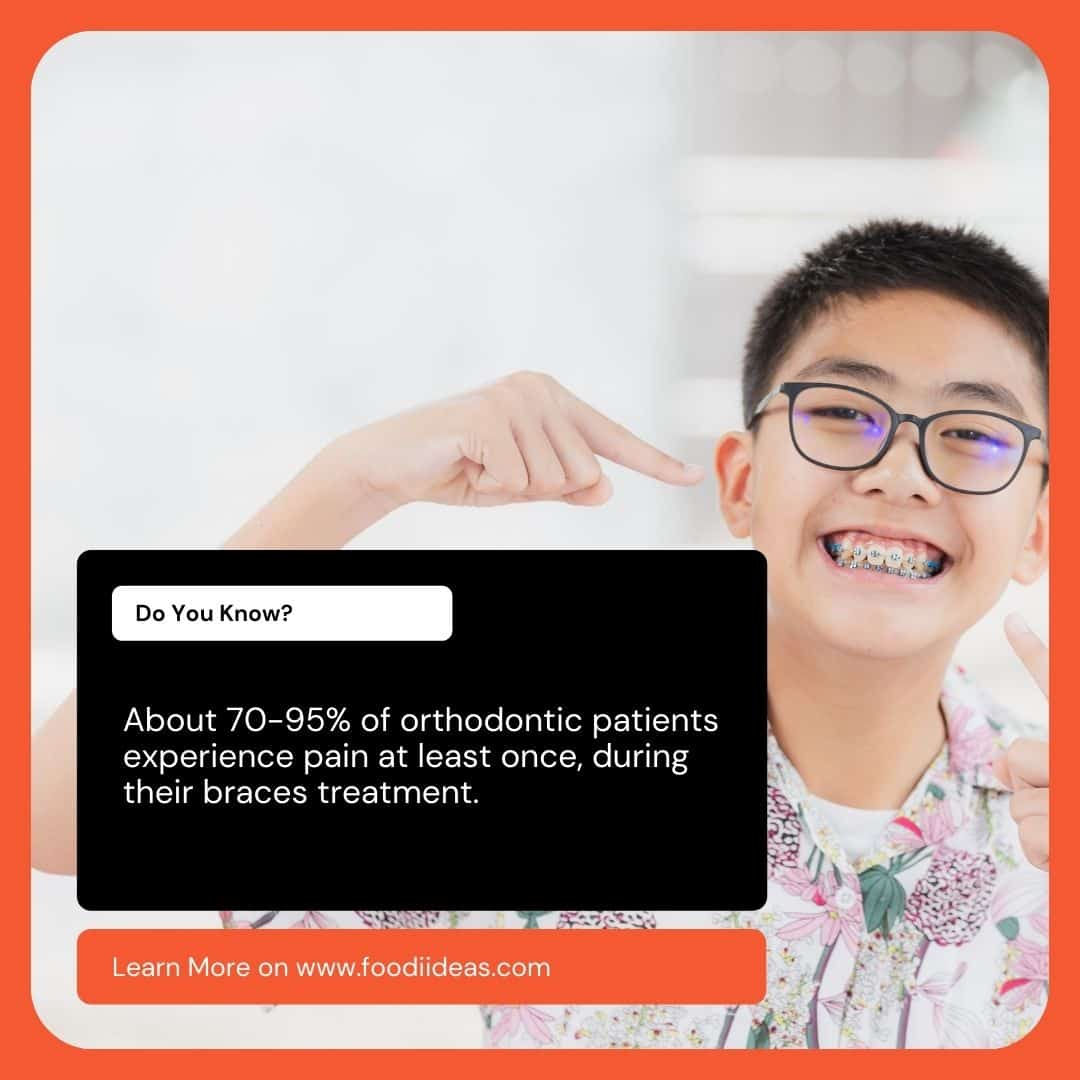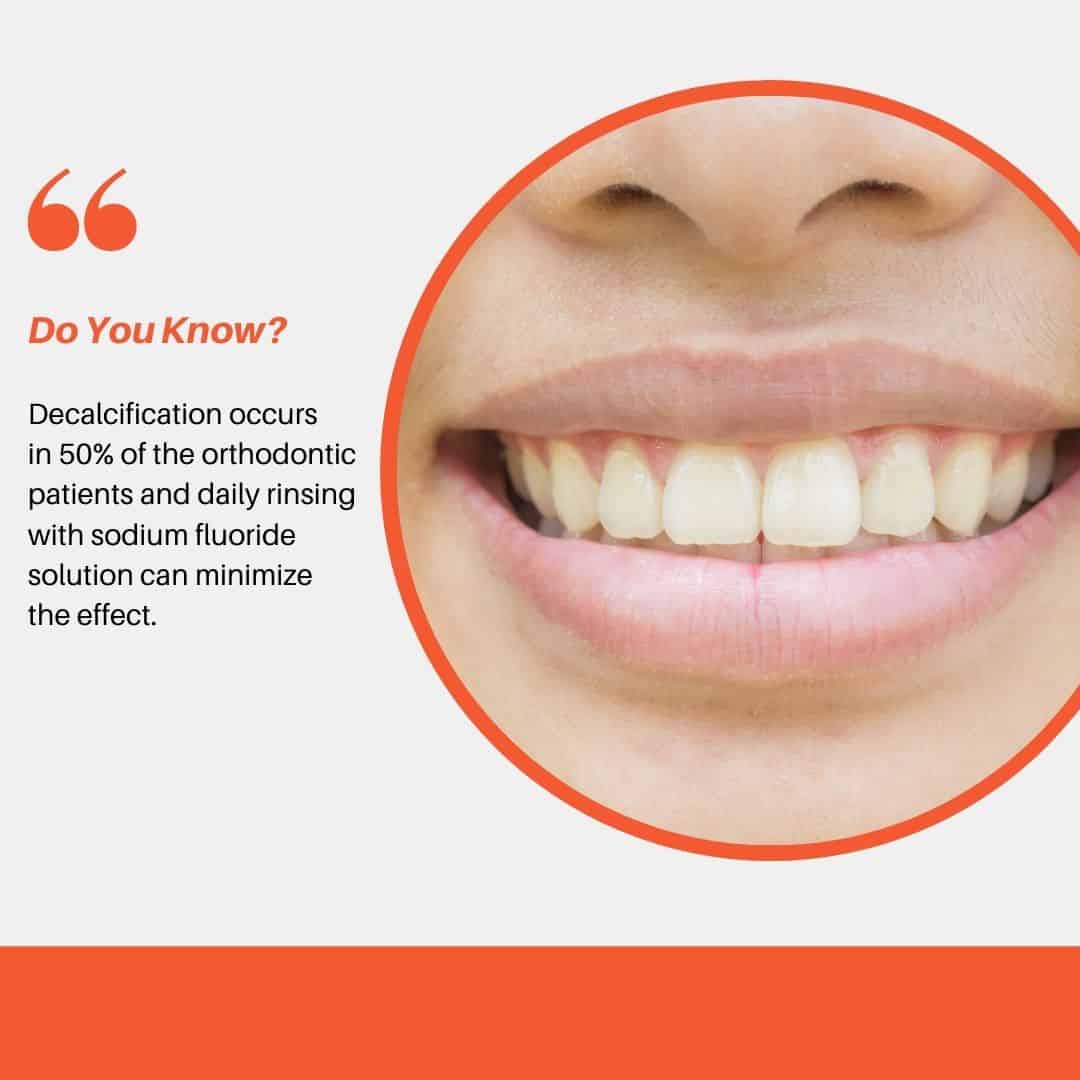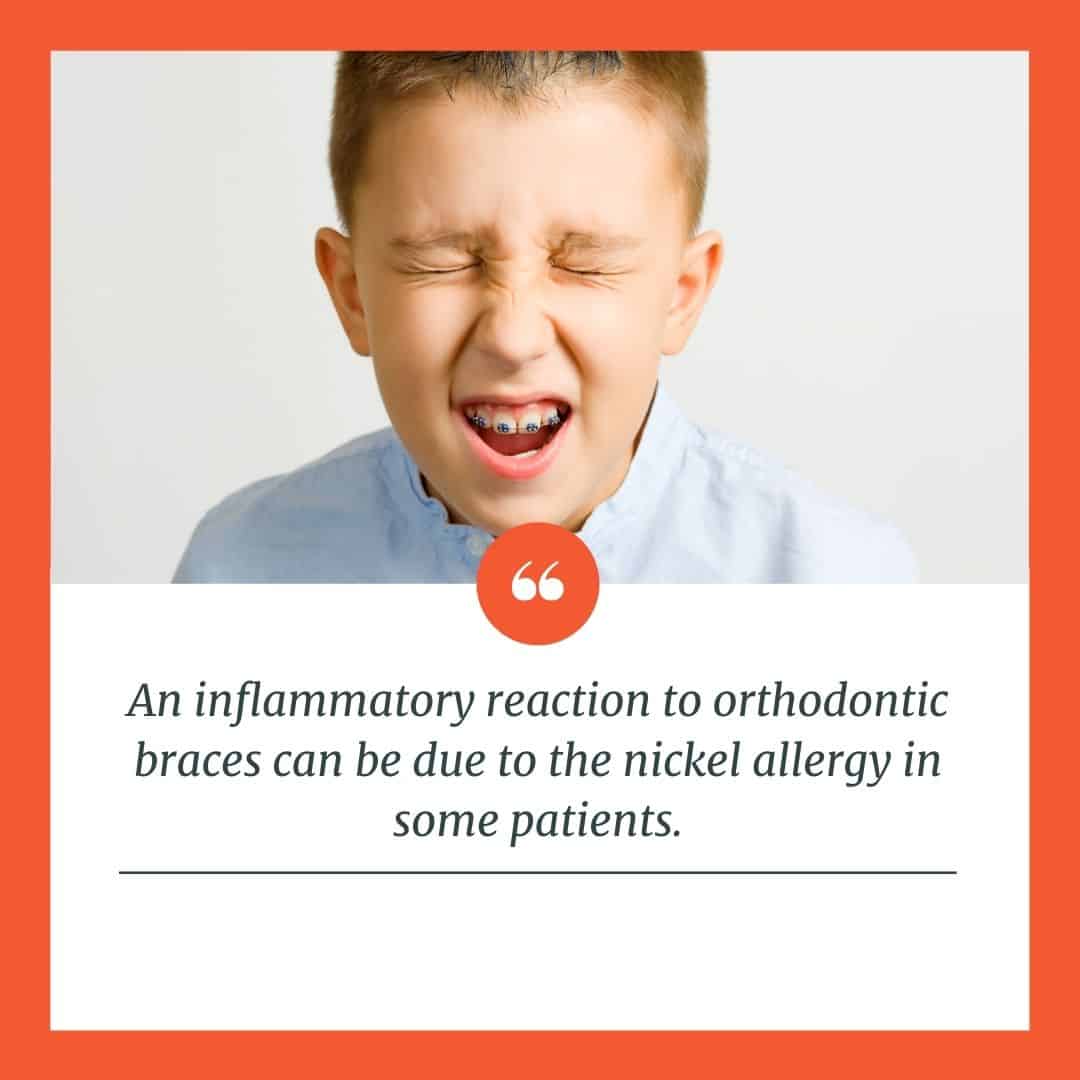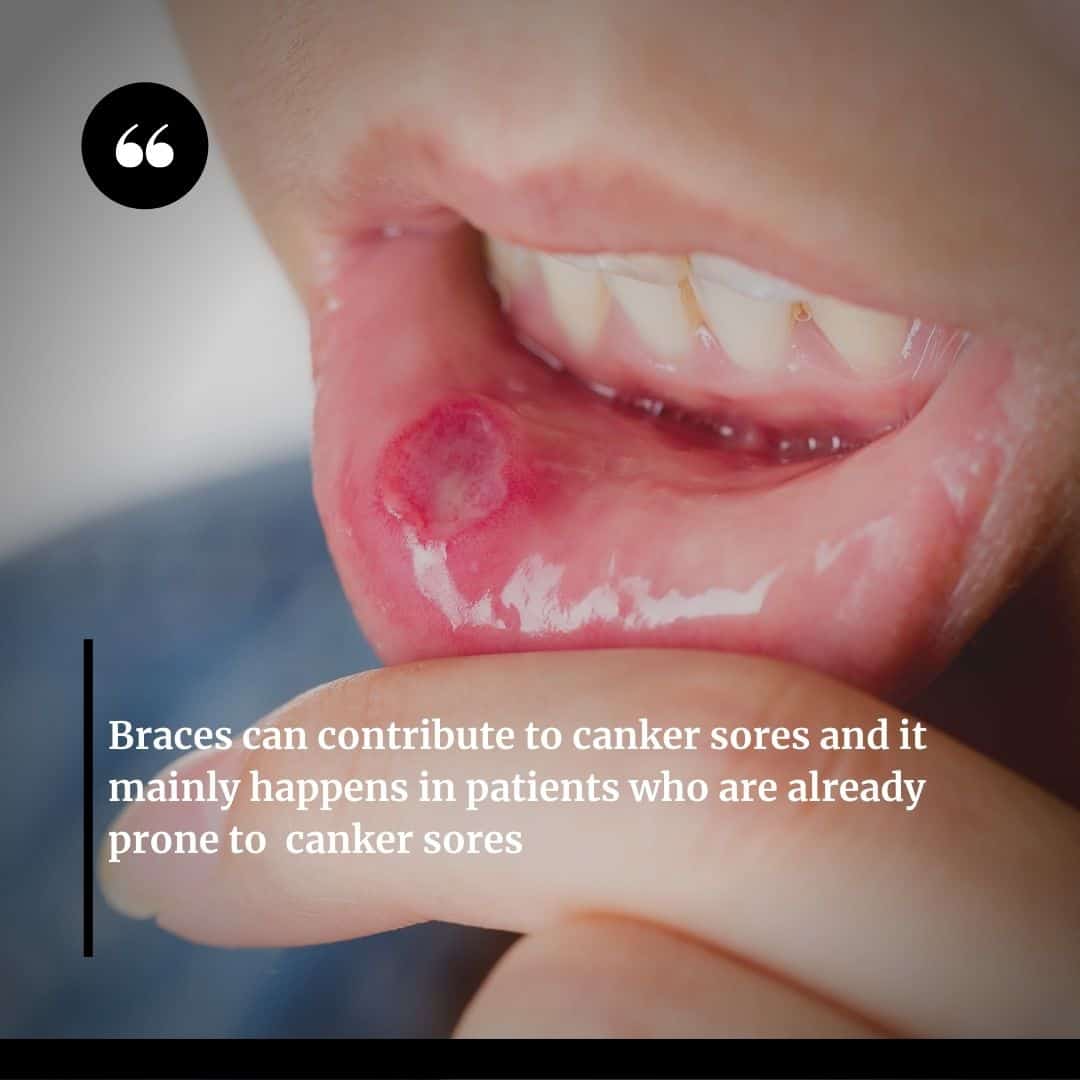We mostly discuss the wonderful advantages of orthodontic braces. We talk about benefits that go past cosmetic concerns and into the domain of overall oral well-being, ignoring any complications and risk factors involved with braces. But do any risks exist while wearing braces?
The answer is simple: yes. No medical or dental treatment is without any consequences.
Generally, getting dental braces is considered to be a safe procedure, but there are some side effects associated with it. While the risk factor involved is low, but it makes us question the reasons not to get braces.
Pain and discomfort following fitting and activation of braces, root resorption, tooth decay, allergic reactions, dental cavities, and dietary restrictions are few potential reasons for not getting braces. However, any risks and limitations specific to an individual must always be consulted by an experienced orthodontist.
Considering all the ins and outs before getting an orthodontic treatment is a must, and here, we are investigating short- and long-term risks combined with 15 reasons for not getting braces.
Short- Term Risks Associated With Braces
- Pain. The first few weeks of braces can be painful due to adjustment and swelling.
- Allergic reaction. Some people develop allergic reactions to the materials used in dental braces. (1)
- Tooth decay and gum disease. Cavities can be formed due to poor oral hygiene during the braces period. (2)
Long-Term Risks Associated With Braces
- Loss of mineral. Loss of minerals occurs to the outer teeth enamel leaving permanent whitish stains on the teeth. (3)
- Shorter root lengths. Some of the bone dissolves while teeth are moving from their place. It causes permanent loss of the tooth, leading to a more unstable tooth. (4)
- Loss of correction. You can get back to square one if you do not follow your dentist’s advice after treatment completion, causing a new hassle for yourself. (5)
15 Reasons Not To Get Braces
No doubt, the orthodontic treatment delivers you a perfect smile and gives a boost to your confidence. But the treatment also has some side effects, which I am going to discuss in detail.
1. Discomfort and Pain
With braces, mild discomfort and pain are typical and should be expected with every new adjustment made to the mouth. Braces work manually to shift teeth into a proper placement which sometimes result in:
- Mouth Pain
- Headaches
- Jaw Pain
It takes a while to get comfortable with your new braces, and you feel irritation during treatment time. But this pain and discomfort can be felt every time your orthodontist tightens your wires to adjust placement.
Severe pain can be felt when excessive force is applied through wires and brackets to align the teeth(6). Some patients feel so much pain that it is unable to tolerate, and they stop their treatment halfway.
Pain is more in the front teeth, which ultimately causes continuous headaches. Orthodontists sometimes prescribe pain killers to relieve the pain, and excessive use of them can be dangerous for body health.
If you need realignment of your jaw, then jaw pain is another possible side effect of braces. It is because of the tension and pressure on teeth.
Usually, pain and discomfort go away within a week or two, and you start getting accustomed to it. Meanwhile, painkillers can be taken to subside any pain.

2. Decalcification and Cavities
Our teeth are covered with a protective layer called enamel. (7) One of the major side effects of dental braces is the decalcification of enamel.
Decalcification is the appearance of permanent whitish stains on teeth due to bad oral hygiene. It is difficult to reach those areas of teeth where brackets and wires are attached through brushing or flossing, leaving bacteria to thrive there.
The bacteria then cause cavities to form, which can lead to many adverse effects such as tooth decay and tooth loss. (8)

3. Allergic Reactions
Allergic reaction to braces is not much common, but it is a possibility. Some patients have an allergy to the latex rubber in the elastics or the nickel or metal used in braces.
Common symptoms of such allergic reaction that can be seen are:
- Burning sensation in the mouth
- Swollen and red gums
- Swelling of the lips
- Rash around the mouth

4. Difficulty in Eating
It is difficult to eat and chew for few days into braces. The tightening and adjustment make it a challenge for the patient to chew anything easily.
Special braces-friendly diets should be followed during this procedure to prevent any further damage to the dental appliances. (9)
The difficulty in eating solid food will resolve after few days. Until then, try to have a soft and liquid diet.
Some foods are off the limit during braces treatment, such as
- Caramel
- hard candies
- nuts
- gummies
Patients end up making wrong choices about their diet that has harmful health effects on their body.
Also Read: 12 Fast Foods to Eat with Braces
5. Damaged Gums and Bones
Braces work by moving the teeth within the bone they are attached to. These bones are hidden under gums. The need for oral hygiene multiplies and stressed upon as compared to individuals without braces.
When dirt and plaque pile up on braces due to non-cleaning of teeth into inner spots, it results in gum disease.
Gum disease can be spread to underlying bone tissues if not treated timely. The tissue damage can cause loosening of teeth, infection, and pus(10), which can delay the orthodontic treatment time.
There can be many factors involved in damaging gums and underlying bones, such as:
- Patient’s oral hygiene
- Smoking or tobacco chewing
- Lifestyle habits
- Poor diet, e.g., excessive sugar intake
6. Damaged Tooth Root
The visible white part of a tooth is called the ‘crown,’ which helps in chewing and biting. Whereas below the crown is the root which acts as a socket inside the bone.
When wires are tightened and force is applied to the teeth during braces installation, the root part of the teeth moves to make room for the bone to change its position and shape. (11)
The forced movement of the tooth can cause roots to erode. The more the force is applied, the more chances of root damage occurs that can even lead to the death of the tooth sometimes.
Also Read: What Can You Not Eat with Braces?
7. Tooth Death
One of the major side effects of braces is tooth decay and death of the tooth.
Each tooth in our mouth is made up of nerves and blood vessels that aids in keeping the tooth alive. When pressure is applied to tighten the wires of braces, it sometimes causes inflammation beneath the tooth area that is made up of nerves. (12)
Many times, this inflammation can go away on its own or by taking anti-inflammatory medicines, but if the condition persists, it can result in the death of the tooth.
Also Read: What to Eat After Tooth Extraction? 10 Best Foods to Eat Right Away
8. Soft Tissue Injuries and Canker Sores
The mouth is experiencing a big change when adjusting to the new orthodontic treatment. Your inner cheeks, gums, and lips feel sore when they make contact with metal braces containing wires and brackets.
Braces trigger soft oral tissues when they get rubbed against the braces’ hard metal material, causing tiny lesions to form, called canker sores. They can cause pain and irritation(13). Orthodontics advise proper treatment for such conditions,
These canker sores can be reduced and avoided by practicing good oral hygiene.

9. Root Resorption
Shortening of the roots during braces is called ‘Root Resorption’(14). It is a fairly common problem due to tooth movement during orthodontic treatment.
Most of the causes of root resorption are unknown, but the most identified risk associated with this problem is the increase in the duration of treatment time.
There are chances of root resorption increase with the length of treatment. Orthodontics evaluates the condition of teeth during the treatment.
If the condition worsens, then orthodontic treatment must be discontinued.
Also Read: What To Eat After A Root Canal? A Definitive Diet Plan
10. Time and Money
Orthodontic treatments can be painful physically and financially. They are costly that can cause a dent in your pocket if not covered by insurance. They sometimes cost between $3000-$6000, but prices may vary according to the patient’s condition and needs.
Braces consume a great deal of time in terms of the treatment period. You will have to visit your orthodontic from time to time besides managing work and school in the case of children.
The treatment period is itself very long and sometimes takes up to 2 years and quite a few follow-ups after procedure completion. You will be needing to invest a great deal of time in your treatment.
Some modern techniques do allow faster results but are not generally recommended by orthodontists unless teeth are in much healthy condition.
11. Aesthetically non-appealing
Patients with metal braces often hesitate to smile whenever someone asks for a photograph as it gives a displeasing look. They become conscious of themselves and lose confidence in themselves.
Braces affect the look of your face and have a severe impact on how your lips, cheek, and chin look like. It can make you less confident during social meetings and unsatisfied with your looks.
12. Extra Cleaning
A thin film of bacteria and food particles while wearing braces gathers on tooth surfaces, causing gum diseases and infections. To avoid an infection, you will have to put extra effort into your oral hygiene while wearing braces.
Cleaning your teeth with brushing and flossing after every meal takes more time and effort. Permanent damage can occur to tooth enamel if teeth and brackets are not kept clean regularly.
If you miss brushing and flossing a few times, then you are more prone to complications that can complicate the rest of orthodontic treatment.
Also Read: What To Eat After A Root Canal?
13. Retainer Maintenance
Retainers are used to ensure that your teeth stay in the new set position after braces.
Even though braces have straightened your teeth, the bones and muscles are not adapted to change sooner. They need retainers as they grow in size when the body grows. Retainers help control this natural shift of mouth.
You will need to clean your retainers after every meal. Brushing them is not enough; they need a thorough cleaning every day. Otherwise, bacteria can cause harmful effects to your appliance.
Maintaining your retainers clean is another hassle you will have to do after braces.
14. Lifestyle Interference
Braces interfere with day-to-day lifestyle habits. It creates a lack of confidence to meet and greet new people as you are more conscious of your appearance.
Braces wearers must avoid few foods, sports, and recreational activities.
People wearing metal braces have to stay away from contact sports like hockey, football, wrestling, and boxing. These type of rough sports poses a threat of damaging and breaking to the braces.
Even playing the flute or a saxophone becomes impossible while wearing braces.
15. Relapsed Teeth
One of the most common consequences is getting teeth back to their previous position after removing braces. Patients who do not follow the instructions of their orthodontists face the loss of correction of teeth.
Patients are advised to use retainers for a long time after the removal of braces to prevent relapse. The risk of relapse is higher if they are not worn properly. (15)
Sometimes retainers are advised to be worn for a longer period to avoid any movement of teeth even after years of braces treatment.
Also Read: Soft Foods to Eat with Braces
Reduce the risk of Braces Treatment
There are many ways in which a patient can reduce the risk of complications associated with the treatment of braces.
- Good oral hygiene. One must practice a routine that involves brushing and flossing after every meal. Soft-bristled and fluoride toothbrushes are recommended choices here.
- Rinse your mouth. Ensure no particles of food are left in your mouth by rinsing it thoroughly after every meal. It will guarantee the durability of braces and their treatment plan.
- Flossing. Floss regularly beneath the spaces of dental wires. Ask your orthodontist to provide wax-coated floss to use within tightly closed spaces of teeth easily.
- Diet. It plays an important role in preventing any complications during the treatment. A braces patient must take a soft and healthy diet and avoid crunchy, hard, and sugary foods to avoid any damage to braces.
- Follow-ups. Regular follow-ups must be done to make sure the appliance fitted in the mouth is perfectly positioned.
Can Braces Damage Your Teeth?
Braces do not damage your teeth themselves. Poor oral hygiene practices cause damage to the enamel on the surface of the teeth. One should maintain good oral hygiene during treatment to avoid any problems later on.
There are many layers inside the teeth which has blood vessels and nerves that keep a tooth alive. The tightening of wires in braces can cause root damage resulting in tooth death in some patients.
How Long Will My Teeth Hurt After Braces Are Put On?
Initial discomfort and pain can be felt for the first 4 days due to braces adjustment and activation. After a while, patients start getting used to the new dynamics of their mouth, making it easier to manage pain at later appointments.
Orthodontics often prescribe pain killers to relieve the pain.
Can Braces Ruin Your Face?
Braces can change the appearance of the face, jaw, or cheekbones. Your orthodontist will inform if he sees any possible occurrence of a change in face structure before the treatment course.
Some patients feel happy with straight smiles, yet some feel unhappy with the results.
At What Age Should You Not Get Braces?
There is no age limit for someone to get braces. You can get them at any age, provided your jawbone is healthy and in suitable condition to bear braces pressure. (16)
Many people think that braces are for children or teens, but the truth is that you can get even them at the age of 50 as fixing wrong bites is crucial for one’s dental health.
Key Takeaway
A person wearing the braces plays a crucial role in the success of the treatment. The patient must follow and listen to his orthodontist’s directions accurately to prevent the risk of relapse after braces removal.
All the side effects mentioned above can be reduced if the patient and orthodontist co-operate with each other in this long treatment plan.
People who have concerns about getting braces should discuss in detail with a specialist to minimize the complications that can arise due to the ignorance of both patients and doctors. Every minor detail be it the unappealing look of the braces, the pain that comes with it, diet restrictions, or treatment duration, everything must be discussed beforehand.
Do let me know your thoughts and remarks in the comment section below.

A nutrition degree holder and a foodie by heart, Madiha Saad loves to inspire people through her writings and uses her knowledge and experience to write articles on trending nutrition topics. She loves to develop new recipes in her pastime. Read More…
Completely agree. I never wanted braces but my parents forced me to get them and wasted a huge amount of money. I’m still suffering the pain 30 years later.
I am feeling very sad for you but at the same time, our parents always want what is best for us. You should consult a good dentist and he might be able to help you ease your pain.
I had the same situation my parents forced me to get braces despite my objections I ended up fighting with them for years and today I still hate them for putting them on my teeth I don’t even wear the retainers anymore as that situation is still painful and raw. The sad part about that is my parents never apologised for this my mum passed away back in 2013 and left me bearing psychological scars
I probably would have started undermining treatment if I were ever forced to get braces. Starting with removing the arch wires, and probably get a hold of my dad’s pliers and wire cutters.
My parents forced me to get braces and I never wanted them in the first place. I suffer from psychological problems because of the pain that I endured during my teen years and still carrying it into my adult years for anyone out there don’t get braces stand up and fight
I am extremely sad to know about your psychological problems and the pain you have endured. Surely, there is nothing that can soothe you in this regard but all we can do is move on and find solutions to our problems because nothing is impossible in this world.